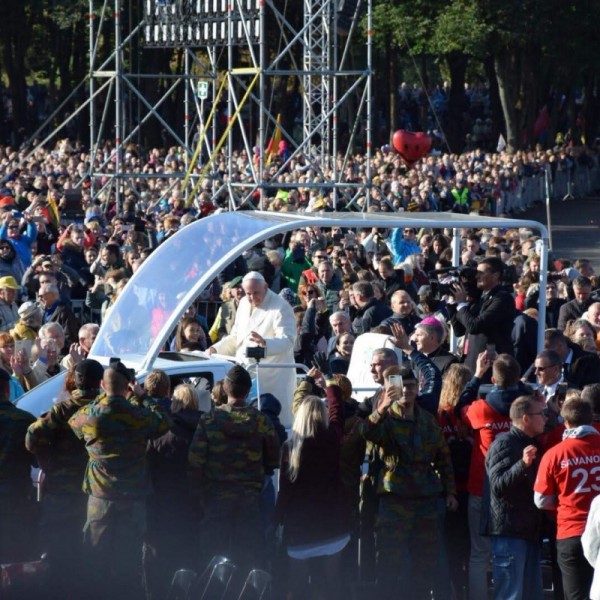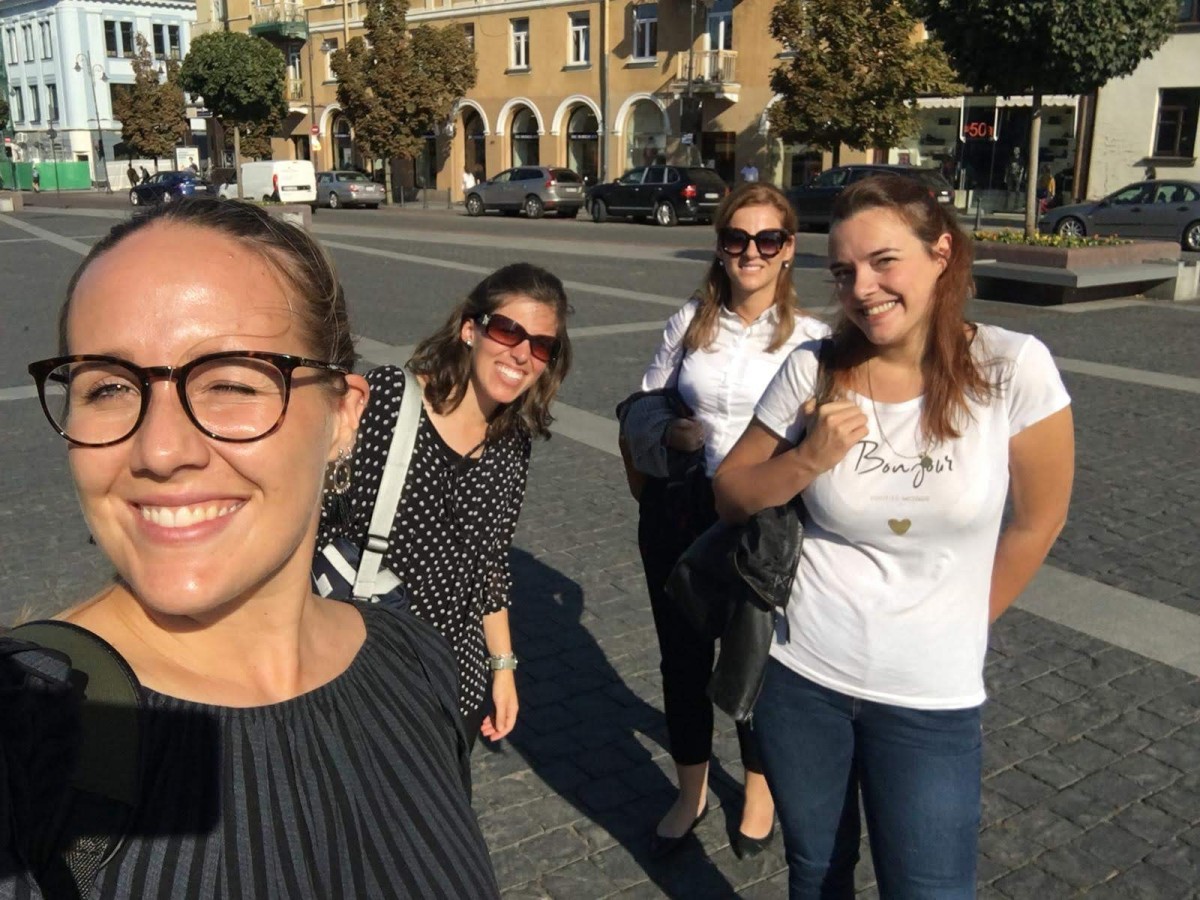Students from the School of Church Communications reflect on their experience as journalists
----------------------------------------
by Helen Keefe
Pope Francis made his 25th Apostolic Visit to the Baltic countries from September 22-25, 2018. A group of four Santa Croce students covered the events of the Pope’s visit to both Lithuanian cities, Vilnius and Kaunas, offering this coverage to local news outlets. With journalist’ accreditation, we could attend the main events of the Papal visit from the media pools, including the Pope’s meeting with the President of Lithuania and his address to the civil society, his encounter with Lithuanian youth, the outdoor Mass in Kaunas, his visit to the Museum of Occupation and Freedom Fights, as well as the Pope’s more intimate meeting with priests, religious, and seminarians in the Cathedral in Kaunas. The experience not only allowed us to have a better understanding of what journalists go through when they cover a mega-event of the Church, but it also gave us an unexpected opportunity to learn about the Church’s situation in Lithuania. A few of the articles that we wrote/contributed to can be seen at the end of this chronicle.

Peripheries. It’s a word Pope Francis likes to repeat, and it’s the first word that comes to mind when attempting to describe his visit to Lithuania, an experience that four students from Santa Croce’s School of Church Communication were able to witness directly this past September. Peripheries is the word, even though Vilnius, the capital city, likes to refer to itself as the “Rome”, “Jerusalem”, and “Bethlehem” of Northern Europe (each name represents a whole backstory that we won’t delve into here.)
Clearly not self-referential, Vilnius isn’t exactly a periphery as far as economic factors are concerned, at least not anymore. But you need only go back and scan the most popular news stories during the visit to verify that the world cared a lot more about the Vatican’s supposedly historical agreement with China on the appointment of bishops (signed on the eve of the Pope’s departure) not to mention the on-going sexual abuse crisis that, as far as Church news is concerned, continues to steal the global spotlight.
The Pope we saw, however, seemed to ignore these competing concerns, perhaps to be able to deal with a subtler – though no less real – local crisis that hasn’t been screaming for attention. In an informational event prior to the trip, Lithuanian priest Monsignor Visvaldas Kulbokas, an official in the Vatican Secretary of State, explained that the Pope had been invited by the government to “come give a word of encouragement, especially for young people but also for the Church, so that it might give its contribution.”
That it was actually the government who invited the religious leader of nearly 80% of its citizens, not just to encourage young people but also to say a word to the local church, might be indicative of something.
Among the Baltic States, Lithuania is without a doubt the most Catholic country, at least as far as numbers go. It is impressive when you consider the years of political oppression and severe religious persecution, suffering like their neighboring countries –Estonia and Latvia– under both the Nazis and the Soviets all within the last century. Lithuanian Catholics can and do pride themselves on keeping the faith under horrific circumstances.
But perhaps it’s harder to acknowledge some of the other possible side-effects of such a difficult past: the existential scars from which even people of faith are not immune. For example, that such a Catholic country also happens to have one of the highest suicide rates in the world, combined with a small population and a declining birthrate, is objectively worrisome. And while some indicators rank Vilnius as Europe’s “happiest capital”, Fr. Kulbokas also pointed out Lithuania’s high ratings of alcoholism and depression. The way he sees it, “There is a lack of courage and entrepreneurship and creativity.”
“When John Paul II came in 1993, his visit marked the end of the Soviet occupation. We had a lot of hope but little experience of freedom,” recalls Fr. Gintaras Bluzas, another Lithuanian priest and fellow student at Santa Croce. “Twenty-five years later, we have plenty of experience of freedom… what we need this time is hope.”
Of course, as students who care about the Church’s communication, we were there primarily to try to tell the Church’s story. We are trained to ask ourselves: how is this relevant? How do I make this topic matter to my audience, specifically?

Scanning articles published on the trip in the English-speaking world, it seems this relevance was achieved by highlighting the fact that the Pope was traveling during a “crisis” moment; that he sent messages of “tolerance” and “solidarity”; that Russia was the elephant in the room, etc. An off-the-cuff response from the Pope jokingly referring to himself as “the devil” next to John Paul II obviously generated some speculation. Perhaps this exercise to generate relevance was easier to do 25 years ago, precisely when the Polish Pope paid a visit to Lithuania, a moment that loomed large for its additional socio-political and historical significance.
But this time, whether it was relevant or not, truth be told, what we witnessed on the ground level was really just a pastoral visit. A visit during which the bishop of Rome stopped to pray a decade of the rosary before the city’s most significant Marian shrine, though that’s probably not of interest to most.
If you were actually there, you would know that the Pope was not focused on telling Lithuanians that they should be “tolerant”, although he did of course mention it. Rather, he encouraged them to seek strength, hope, and joy precisely in the very faith of their fathers. He did this in every single address delivered during the visit:
“This is the prayer voiced in your national hymn: ‘May your sons draw strength and vigor from your past experience’, so as to face the present with courage… To draw strength from the past is to recover those roots and keep alive all that continues to be most authentic and distinctive about you.” (Meeting with the Authorities, with civil Society and with the Diplomatic Corps in the square in front of the Presidential Palace)
“You are the children of martyrs: that is your strength. And may the spirit of the world not tell you something different than what your forebears experienced. Remember your martyrs and follow their example: they were not afraid.” (Meeting with Priests, Men and Women Religious, Consecrated Persons and Seminarians)
“Don’t forget the roots of your people. Think of the past, speak with the elderly: it is not boring to speak with the elderly. Go and find the elderly and let them tell you about the roots of your people, their joys, their sufferings, their values. In this way, by drawing on your roots, you will carry your people forward, the history of your people, for greater fruitfulness. Dear young people, if you want a people who are great and free, take their memory from the roots of the past and carry your people forward.” (Meeting with young people in the Square in front of the Cathedral)
At the same time, the Pope did not shy away from the more touchy topics, lightly encouraging Lithuania to “step it up” as a church and embrace the full message of the Gospel, also for the sake of the common good.
During his prayer at the Museum of Occupations and Freedom Fighters, he prayed: “Lord, we pray that your cry may keep us alert and may free us from the spiritual sickness that remains a constant temptation for us as a people: forgetfulness of the experiences and sufferings of those who have gone before us.”

To the priests, religious and seminarians, he insisted on the same point, speaking to them without notes:
“Spiritual sadness is an illness. [Religious people can be] sad because they do not find love, because they have not fallen in love with the Lord… Please, when you find yourselves sad, stop, and seek out a wise priest, a wise sister. Not wise because they have university degrees: wise because they have been able to move forward in love. Go and ask for counsel. When that sadness starts, we can predict that if it is not cured in time, it will turn you into sad old spinsters and bachelors, men and women who are not fruitful. And of this sadness you should be afraid! It is the devil who sows this.”
This wake-up call from the Pope to the Lithuanian church was clearly felt on the local level. Commenting on the Pope’s encounter with priests, religious and seminarians held in Kaunas on the second day of the visit, a Lithuanian priest Fr. Algirdas Akelaitis said, “It was important for the Pope to meet us: this part of the Body of Christ needs to function properly. If one part of the body works inadequately, then the whole body will be off. And this part of the Body needs support."
Fr. Gintaras of Santa Croce was also present at the encounter: "It struck me that the Pope told us our pastoral work cannot be improvised. I want to think more about this."
Of course, perhaps none of this is very relevant for many audiences today. And maybe this is, at least in part, precisely what the Pope has in mind when he talks about “peripheries”. You don’t have to be Rome or Jerusalem to be “relevant” to God. And what is more urgent: the Church’s PR problems… or the Church’s real problems, not all of which receive media coverage?
That can remain a rhetorical question, at least for the Pope.
Articles to which we contributed during the trip:
http://m.niedziela.pl/artykul/37998/Po-25-latach-Wilno-ponownie-wita-Papieza
http://m.niedziela.pl/zdjecia/2302/Po-25-latach-Wilno-ponownie-wita-Papieza/30
http://www.niedziela.pl/artykul/38018/Kowno-ponad-100-tys-wiernych-na-Mszy-sw
http://www.bihon.ro/bihoreanca-alaturi-de-papa-francisc-in-tarile-baltice/2115038
Sezione:

